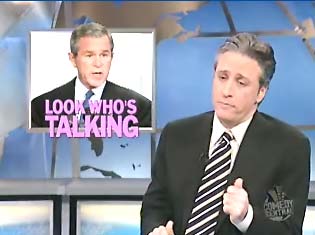Below is a version of an essay I wrote for today's Diamondback (link) decrying FCC censorship of "indecency" as arbitrary, harmful to creative content, and a substitute for poor parenting.

Since the infamous 2004 Super Bowl halftime show revealed to America that Janet Jackson did, in fact, have a nipple on her right breast, the government has become increasingly strict about cracking down on broadcast “indecency”. By raising fines for infractions to obscene amounts, the government is bullying content providers into submission. Meanwhile, the Federal Communications Commission continues to expand its regulatory reach.
Unfortunately, the FCC uses a completely arbitrary determination of what constitutes indecency. They also employ overly-punitive measures which stifle creative content. Most troubling of all, this brand of regulation is yet another substitute for uninvolved parenting.
There are many examples of the FCC’s vagueness over what exactly constitutes indecency. When Bono used the F-word as an adverb at the 2003 Golden Globe Awards, the commission ruled he was not being indecent because he was not referring to sexual or excretory functions. The FCC changed their minds a year later, deciding that the F-word is totally off limits.
The status of other words or content is notoriously nebulous. It is generally accepted that using the S-word is acceptable (as famously demonstrated in the
South Park episode
“It Hits the Fan”), but in early 2006 the FCC declared that the same word with the prefix “bull” was “grossly offensive”. Oh, and you can’t say “dickhead”.
You might reasonably point out that our culture has already become so coarse, so it’s good that we take a stand. One problem with that is that the FCC enforces
unwritten indecency rules. That’s right, TV networks don’t know what infractions they are supposed to avoid; it’s up to the FCC to decide. The FCC claims that they don’t publish specific rules because that would constitute censorship; rather, they only react when someone complains.
Of course, with extremist organizations like the innocuously named American Family Association around, someone always complains. (The AFA, by the way, sought to boycott the animated movie
Shark Tale because it supposedly promoted gay values.) For some reason these busybodies actually get taken seriously as representative of the general public.
Family Guy’s Peter said it best in the Emmy-nominated episode
“PTV”, explaining that to the FCC, “one complaint equals one billion people.”
Thus, we have situations like the one last year where ABC affiliates refused to air the movie
Saving Private Ryan for fear of drawing complaints. Complaints can be very expensive. Under current FCC rules, CBS affiliates would have been fined a whopping $32,500,000 for a single racy scene in an episode of
Without a Trace last year. That’s more money than it costs to produce all episodes of the series for an entire season. Given that kind of climate, it’s no wonder Fox Entertainment head Peter Liguori recently described the “chilling effect” the FCC’s recent rulings have had on creative freedom.
I’m not going to deny that there are some clear-cut instances of content that is inappropriate for airing over network TV. But the FCC doesn’t just police the obvious violations and leave the rest to the good judgment of viewers. In fact, in a report issued Tuesday, the FCC announced efforts to
broaden its regulatory scope and even start patrolling the cable channels that viewers intentionally pay to bring into their homes.
The sad fact is that all this is being done in the name of protecting children. Of course, the easiest way to protect children is for parents to do their job. If parents monitored their kids’ TV habits and/or used the V-chip, we wouldn’t have this problem of government intervention. Seriously, if they start messing with Eric Cartman and Tony Soprano, I’ll get really pissed.

 I'm not much of a video game player--I don't have an Xbox, Playstation, or Wii in my apartment, and my gaming is limited to a rare bit of
I'm not much of a video game player--I don't have an Xbox, Playstation, or Wii in my apartment, and my gaming is limited to a rare bit of 

 Having been laid out sick in bed for most of the past week, I finally got around to watching the recent, much talked-about
Having been laid out sick in bed for most of the past week, I finally got around to watching the recent, much talked-about